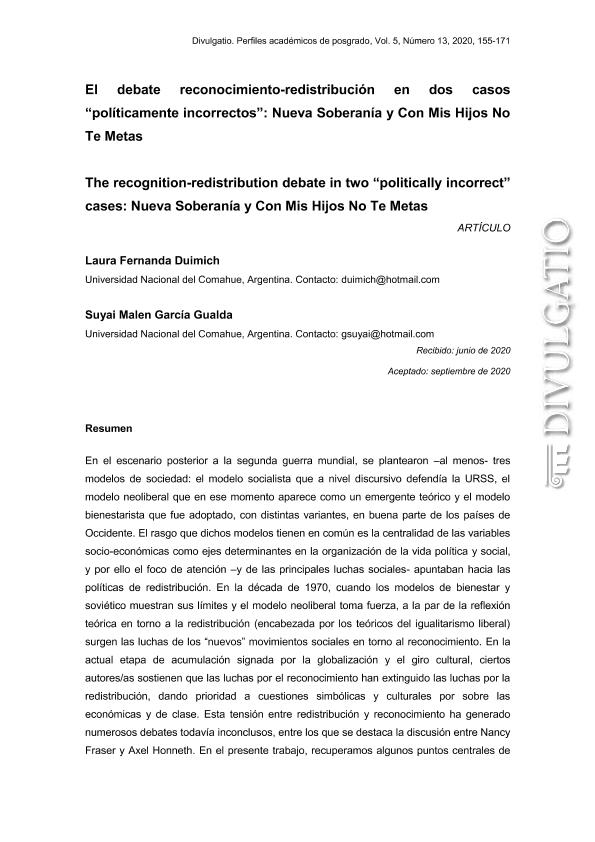Mostrar el registro sencillo del ítem
dc.contributor.author
Duimich, Laura Fernanda

dc.contributor.author
Garcia Gualda, Suyai Malen

dc.date.available
2021-09-15T19:54:28Z
dc.date.issued
2020-11-16
dc.identifier.citation
Duimich, Laura Fernanda; Garcia Gualda, Suyai Malen; El debate reconocimiento-redistribución en dos casos ''políticamente incorrectos'': Nueva Soberanía y Con Mis Hijos No Te Metas; Universidad Nacional de Quilmes. Secretaría de Posgrado; Divulgatio; 5; 13; 16-11-2020; 155-171
dc.identifier.issn
2591-3530
dc.identifier.uri
http://hdl.handle.net/11336/140441
dc.description.abstract
En el escenario posterior a la segunda guerra mundial, se plantearon –al menos- tres modelos de sociedad: el modelo socialista que a nivel discursivo defendía la URSS, el modelo neoliberal que en ese momento aparece como un emergente teórico y el modelo bienestarista que fue adoptado, con distintas variantes, en buena parte de los países de Occidente. El rasgo que dichos modelos tienen en común es la centralidad de las variables socio-económicas como ejes determinantes en la organización de la vida política y social, y por ello el foco de atención –y de las principales luchas sociales- apuntaban hacia las políticas de redistribución. En la década de 1970, cuando los modelos de bienestar y soviético muestran sus límites y el modelo neoliberal toma fuerza, a la par de la reflexión teórica en torno a la redistribución (encabezada por los teóricos del igualitarismo liberal) surgen las luchas de los “nuevos” movimientos sociales en torno al reconocimiento. En la actual etapa de acumulación signada por la globalización y el giro cultural, ciertos autores/as sostienen que las luchas por el reconocimiento han extinguido las luchas por la redistribución, dando prioridad a cuestiones simbólicas y culturales por sobre las económicas y de clase. Esta tensión entre redistribución y reconocimiento ha generado numerosos debates todavía inconclusos, entre los que se destaca la discusión entre Nancy Fraser y Axel Honneth. En el presente trabajo, recuperamos algunos puntos centrales de dicha controversia con el objetivo de analizar dos casos concretos: el grupo neonazi Nueva Soberanía y el movimiento Con mis hijos no te metas.
dc.description.abstract
In the post-World War II scenario, at least three models of society were developed: the socialist model defended by the USSR, the neoliberal model which appears as a theoretical novelty,and the welfare model that was adopted, in different ways, in a large part of the Western countries. These models share a common core: the centrality of social and economic features in the organization of political and social life, and therefore the focus of attention - and the main social struggles - pointed towards the policies of redistribution. In the 1970s, when the welfare and Soviet models showed their limits and the neoliberal model gained strength, theoretical work on redistribution (led by liberal-egalitarian theorists)emerged together with struggles of the “new” social movements on recognition. In the current stage of accumulation marked by globalization and the cultural turn, some authors argue that struggles for recognition have extinguished struggles for redistribution, giving priority to symbolic and cultural issues over the economy and class struggle. This tension between redistribution and recognition has generated numerous debates still unfinished, among which the discussion between Nancy Fraser and Axel Honneth stands out. In the present work, we look into some central points of this controversy with the aim of analysing two specific cases: the Nueva Soberanía neo-Nazi group and the movement Con mis hijos no te metas.
dc.format
application/pdf
dc.language.iso
spa
dc.publisher
Universidad Nacional de Quilmes. Secretaría de Posgrado
dc.rights
info:eu-repo/semantics/openAccess
dc.rights.uri
https://creativecommons.org/licenses/by-nc-nd/2.5/ar/
dc.subject
REDISTRIBUCIÓN
dc.subject
RECONOCIMIENTO
dc.subject
JUSTICIA SOCIAL
dc.subject.classification
Otras Ciencia Política

dc.subject.classification
Ciencia Política

dc.subject.classification
CIENCIAS SOCIALES

dc.title
El debate reconocimiento-redistribución en dos casos ''políticamente incorrectos'': Nueva Soberanía y Con Mis Hijos No Te Metas
dc.title
The recognition-redistribution debate in two ''politically incorrect'' cases: Nueva Soberanía y Con Mis Hijos No Te Metas
dc.type
info:eu-repo/semantics/article
dc.type
info:ar-repo/semantics/artículo
dc.type
info:eu-repo/semantics/publishedVersion
dc.date.updated
2021-09-06T20:15:42Z
dc.journal.volume
5
dc.journal.number
13
dc.journal.pagination
155-171
dc.journal.pais
Argentina

dc.journal.ciudad
Bernal
dc.description.fil
Fil: Duimich, Laura Fernanda. Consejo Nacional de Investigaciones Científicas y Técnicas. Centro Científico Tecnológico Conicet - Patagonia Confluencia; Argentina. Universidad Nacional del Comahue; Argentina
dc.description.fil
Fil: Garcia Gualda, Suyai Malen. Consejo Nacional de Investigaciones Científicas y Técnicas. Centro Científico Tecnológico Conicet - Patagonia Confluencia; Argentina. Universidad Nacional del Comahue; Argentina
dc.journal.title
Divulgatio
dc.relation.alternativeid
info:eu-repo/semantics/altIdentifier/url/https://ojs.unq.edu.ar/index.php/divulgatio/article/view/106
dc.relation.alternativeid
info:eu-repo/semantics/altIdentifier/doi/https://doi.org/10.48160/25913530di13.106
Archivos asociados
